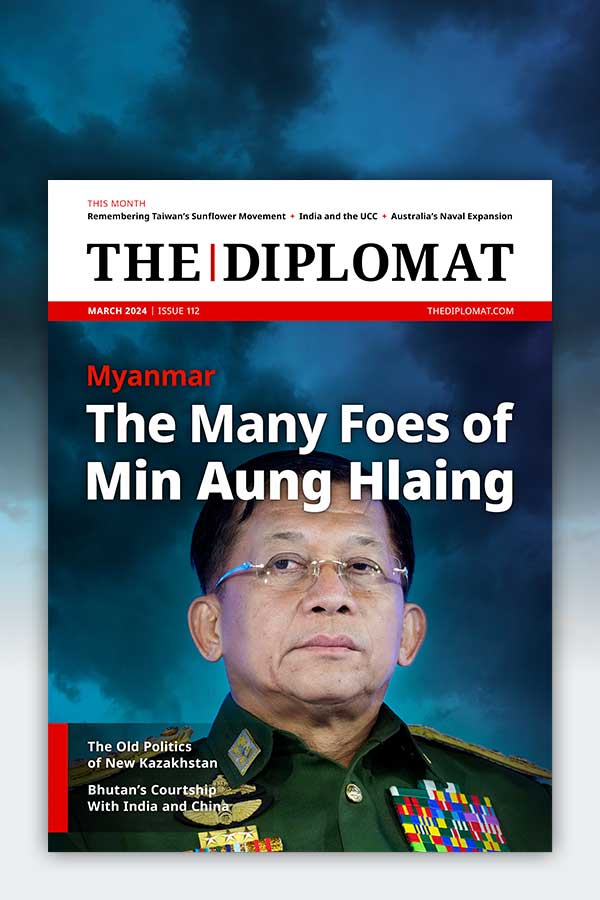| Welcome to the latest issue of Diplomat Brief. This week our top story delves into the root source of discontent among India’s farmers, who are marching on Delhi for the second time in three years. We also have an interview with Kloop co-founder Rinat Tuhvatshin on the pressures facing Kyrgyzstan’s media sector. |
| Story of the week | ![[object Object]](https://thediplomat.com/diplomat-brief/2024/vol09/images/feature.jpg?v=1) | Economy The Economics Behind India’s Farmers ProtestsWhat Happened: India’s farmers are back on the march to New Delhi, nearly three years after a months-long protest forced the Modi government to scrap controversial agriculture laws. More than 20,000 farmers are trying to reach the capital, alleging that the government has failed to honor the promises it made to end the last protest in 2020-21. At the core of the issue is the precarious economic situation faced by India’s farmers, who live on an average income of just $120 a month. Their major demand: legally binding minimum support prices (MSP) for 23 crops. Our Focus: The economics and politics of the MSP program are complex. The government already sets minimum prices for 22 crops, but in practice the state almost exclusively buys wheat and rice. And private buyers aren’t bound by the MSP. “Thus the support price system, introduced in the 1960s to help India maintain food security, only gives benefits to a minuscule number of farmers,” writes veteran journalist Bibhudatta Pradhan. Farmers want to change that by legally requiring a minimum price for all agricultural purchases. But critics warn such a move “would be a fiscal disaster and have inflationary consequences” – with one estimate predicting a 25-30% jump in food prices. What Comes Next: The MSP debate and, more broadly, the dismal living conditions of farmers are perennial issues in Indian politics. The latest protest comes at a sensitive time, however, with India expected to hold general elections in the spring. “Farmers don’t always vote as one bloc but enjoy sizable influence in the countryside, where most Indians live,” Pradhan explains. “Hence the government tries to avoid any major confrontation with them.” But with the farmers less united this time – and the government response more robust – it’s unlikely we’ll see a repeat of the stunning capitulation of 2021. Read this story |
| Behind the News | INTERVIEW Rinat TuhvatshinRinat Tuhvatshin, co-founder of Kloop, one of Kyrgyzstan’s most impactful media outlets, on the pressure being applied on Kyrgyz media: “That is the problem that the media in Kyrgyzstan currently face. It is impossible to predict what will trigger the country’s authorities. It will probably lead to cases of severe self censorship in some media… It is also worth noting that not a single media outlet stopped working because of the pressure.” Read the interview |
| This Week in Asia | Northeast Asia A Japan-North Korea Summit?After years of rejecting every offer for dialogue from South Korea and the United States, North Korea made a rare overture to Japan. Japanese Prime Minister Kishida Fumio has been signaling his interest in a leader’s summit with Kim Jong Un, and now Pyongyang has indicated there is “no reason not to” respond positively – that is, if Tokyo is willing to drop pressure on North Korea over the issue of Japanese nationals abducted decades ago. It’s a condition Kishida is unlikely to meet. Find out more | South Asia UN Meetings on Afghanistan Highlight Global DivisionsThe U.N. Security Council held a rare meeting on Afghanistan this week, but the attempt to forge consensus only ended up underlining differences. 11 UNSC members signed a letter demanding the Taliban rescind all policies oppressing women and girls; the other four members (China, Russia, Algeria, and Mozambique) refused to sign. The meeting was a microcosm of the essential debate that has bifurcated the international response to Afghanistan: Liberal governments farther afield are inclined to ignore the Taliban until they make progress on human rights, while governments closer to home – many leaning toward the autocratic side of the scale – see more value in engagement. Find out more | Southeast Asia Losing Indonesian Candidates Call For Poll ProbeThe two losing campaigns in this month’s presidential election in Indonesia have called for a formal investigation into the conduct of the polls. Defense Minister Prabowo Subianto won an estimated 58 percent of the vote on February 14, but the ruling Indonesian Democratic Party of Struggle (PDI-P), whose candidate Ganjar Pranowo won an estimated 17 percent, said this week that it was calling for a parliamentary investigation into the election and would file legal challenges with the Constitutional Court. A senior PDI-P official said that the February 14 election was tainted by “abuse of power, ranging from legal aspects to the use of state facilities,” claims echoed by a number of election monitoring groups. The other contender, Anies Baswedan, has voiced his support for the challenges, ensuring that there will be plenty to watch between now and Prabowo’s inauguration in October. Find out more | Central Asia Karakalpak Activist Recognized as an Asylum Seeker in KazakhstanKarakalpak activist Aqylbek Muratbai has reportedly been granted an asylum seeker certificate in Kazakhstan, where he is presently in detention at the request of authorities in neighboring Uzbekistan. Tashkent arguably views his activism as a threat. The asylum seeker certificate prevents Muratbai from being extradited for at least three months. Muratbai became active in speaking about Karakalpak issues after a friend was detained in Kazakhstan in September 2022 and has served as a vital source for journalists and human rights organizations since. Find out more |
| Visualizing APAC |  | Source: Ain o Salish Kendra Despite friendly relations between their governments, an average of 30 Bangladeshis are killed each year by India’s Border Security Force. See the full picture |
| Word of the Week | Politics ข็นครกขึ้นภูเขาKhen khrok khuen phukhao: A Thai idiom literally meaning “to push barrels up the mountain.” The metaphor refers to undertaking a task that requires you to use all of your energy. Find out more |
|  |

![[object Object]](https://thediplomat.com/diplomat-brief/2024/vol09/images/feature.jpg?v=1)

